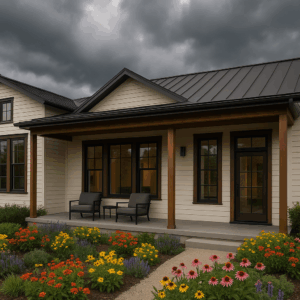Are you interested in saving up to 20% on your energy bills every year?
With these 10 tips from the Piedmont Environmental Council and the Loudoun County Green Home Program, you can do just that. As an added benefit, these energy savings tips will reduce the environmental impact of household energy usage and extend the life of your space and water heating appliances.
Light Right – average savings $100/year
Did you realize that by changing your incandescent light bulbs to CFL or LED, you can cut your space lighting energy usage by 75%? To reduce the initial investment while saving money long term, set a goal to replace all the light bulbs in your home within one calendar year. Make sure to replace the most frequently used bulbs first to maximize savings and be sure to dispose of used CFL bulbs properly.
Warm Water Well – average savings $50/year
3 simple strategies can save money on your water heating bill:
- Set your water heater’s thermostat to 120 degrees.
- Install an insulation blanket around your water heater and insulation wraps on your hot water pipes.
- Install low flow showerheads to cut down on your overall hot water usage.
Program Your Comfort – average savings $60/year
Install a programmable thermostat in your home to match the heating or cooling needs of your daily schedule and vacations. Recommended temperature guidelines for thermostats call for 68 degrees in the winter and 78 degrees in the summer.
Add a Blanket – average savings $100/year
Upgrade the level of insulation in your attic and crawl space. Aim for an insulation value of R49 for the Virginia and Maryland areas (this could mean up to 12 inches of insulation in your attic.) Cellulose is the most effective of the blown-in insulations and will create more uniform coverage of the attic floor without the gaps in traditional batt style insulations.
Put a Hat on It – average savings $20/year
After insulating your attic, don’t forget to button up the attic hatch. Weatherstrip the attic access hatch or install and air tight cover in attic stair applications.
Defeat Drafts – average savings $35/year
Sealing gaps, cracks and holes around your windows, doors, pipes and outside access electrical cords will prevent air leakage and save you money. These simple, affordable fixes can be accomplished with foam, caulk and/or weather stripping. Click here for more information.
Go With the Flow – average savings $20/year
Replacing HVAC filters at regular intervals will improve the performance of your air conditioning and heating units. Dirty and obstructed filters not only fail to filter the indoor air properly, they force the HVAC blowers to work much harder and use more energy.
Follow the Sun – average savings $15/year
Use window blinds and curtains to help maintain temperature control in your home. In the winter, open window treatments during daylight hours and close them at night. This allows passive solar heat to naturally warm your home. Conversely, In the summer, close blinds and drapes in the daylight hours to keep out the sun’s heat.
Dial it Back – average savings $35/year
Use these simple steps to cut back on your energy usage:
- Use cold water and cold-water detergent to wash clothes.
- Use the manufacturer’s recommended temperature settings on your refrigerator and freezer.
- Line-dry clothes, when possible.
- Do not use the heated drying feature on your dishwasher.
Kill the Phantoms – average savings $25/year
Electronics drain power even when not in use. Plugging electronics into a power/surge protection strip with an on/off switch allows the homeowner to turn all of the units plugged in to the off position and eliminate the residual draw. Unplugging electronics that are rarely used also cuts down on phantom usage.
If you have any questions about these or other home improvements aimed at saving money and energy, please contact the experts at Windows on Washington and we will be glad to provide you with answers.
{{cta(’70c033af-0ba2-4037-9b4c-3a988d11c3cb’)}}



